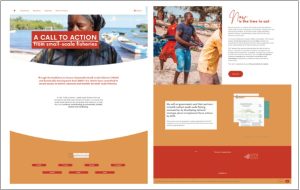The second Small-scale Fisheries Summit held in Rome on July 5-7, 2024, offered a forum for constructive dialogue and showed what needs to be done
This article is by Gaoussou Gueye (gaoussoug@gmail.com), President, African Confederation of Professional Artisanal Fishing Organizations (CAOPA), Mbour, Senegal
It has been ten years since the adoption of the Voluntary Guidelines for Securing Sustainable Small-scale Fisheries in the Context of Food Security and Poverty Eradication (the SSF Guidelines). That was the backdrop of the second Small-scale Fisheries Summit, held on July 5-7, 2024, at the headquarters of the Food and Agriculture Organization of the United Nations (FAO) in Rome, Italy. Its main objective was to “promote priority actions” for the implementation of these guidelines, in particular through in-depth dialogue with governments. The Summit also aimed to provide a space, particularly for artisanal fisheries organizations from around the world, to get to know one another better and to explore collaboration between professional artisanal fisheries organizations and civil society organizations (CSOs).
On this last point, the Summit was clearly a success. It was rich in exchanges of experience and points of view among SSF organizations. It also laid the foundations for constructive dialogue with many environmental organizations, including those on the summit’s organizing committee. However, it will be much better if the organizing committee of future events is made up primarily of SSF trade organizations, particularly those from the Global South, whether or not they are members of the International Planning Committee for Food Sovereignty (IPC). The needs of inclusion and diversity must not undermine the primary objective of such a gathering: supporting the voiceless and marginalized SSF communities.
… it will be much better if the organizing committee of future summits is made up primarily of SSF trade organizations, particularly those from the Global South…
As part of the dialogue with NGOs, participants had the opportunity to share the rules of conduct adopted by the artisanal fishing organizations’ signatories to the Call to Action. These rules of conduct are essential to ensure a respectful dialogue among SSF actors and the organizations that support them. In particular, these rules require that small-scale fishers are enabled to speak for themselves, without NGO intermediaries.
Discussions with the Rise up NGO Platform present at the Summit a very positive development. A webinar was organized to explain these rules to the members. Discussions with environmental NGOs also led to a better understanding of the role of SSF in biodiversity conservation. A number of participants signed a declaration on this topic at FAO’s Committee on Fisheries (COFI). It is worth repeating that the Summit was a great success from the point of view of dialogue and exchanges among the men and women from SSF subsector and civil society organizations, particularly environmental organizations.
However, when looking at the summit as a platform for dialogue between small-scale fishers and governments, the results were mixed. The practical implementation of the directives rests, to a large extent, with States; it is essential that future summits do much more to move in this direction. It would be a shame to reduce any future artisanal fisheries summit to a mere opportunity to share experiences, to engage in dialogue between fishers and civil society, and to make—for the hundredth time—a vague declaration on artisanal fisheries, unrelated to the issues on COFI’s agenda.

The Summit should have allowed fishers and support organizations to discuss the issues on the COFI agenda, to take common positions, and then to have the opportunity to defend them before the governmental delegations. On this occasion, however, this did not happen. To illustrate the disconnect between the Summit and COFI, most of the participants did not stay to attend COFI. Given the absence of most States at the Summit, this lacuna did nothing to facilitate dialogue between the artisanal fishing organizations and their State representatives.
In future summits, SSF organizations need to be better prepared, including by encouraging dialogue with States. A great deal of information and experiences can be shared in advance among the participants. In the case of Africa, the African Confederation of Artisanal Fisheries Professional Organizations (CAOPA) took part in a meeting of African fisheries and aquaculture ministers in Tanzania, through AFRIFISH, the continental platform of non-State fisheries actors that it chairs. The aim was to prepare for the COFI meeting, with a particular focus on the challenges facing SSF. We are going to do everything we can to ensure that this type of preparatory meetings, which involve the participation of African small-scale fishers and civil society actors, becomes a regular occurrence and takes place before each COFI and SSF summit.
Future summits should become a unique opportunity to deepen the dialogue between SSF professionals and governments. They must create a platform to urge governments to implement the SSF Guidelines, by making concrete proposals linked to the current challenges facing fisheries, which need to be addressed by COFI.
On this last point, the publication of the Fishers Call to Action in 2022, which is rooted in the SSF Guidelines, provides clear ideas for concrete action by the signatory artisanal fisheries organizations.
For more
2nd Small-scale Fisheries Summit (SSF Summit 2024), Rome, Italy
https://icsf.net/resources/2nd-small-scale-fisheries-summit-ssf-summit-2024-rome-italy/
2nd Small-scale Fisheries Summit
https://ssfhub.org/ssf-summit-2024
African Confederation of Artisanal Fisheries (CAOPA)
https://caopa.org/en/welcome/
CFFA
https://www.cffacape.org/